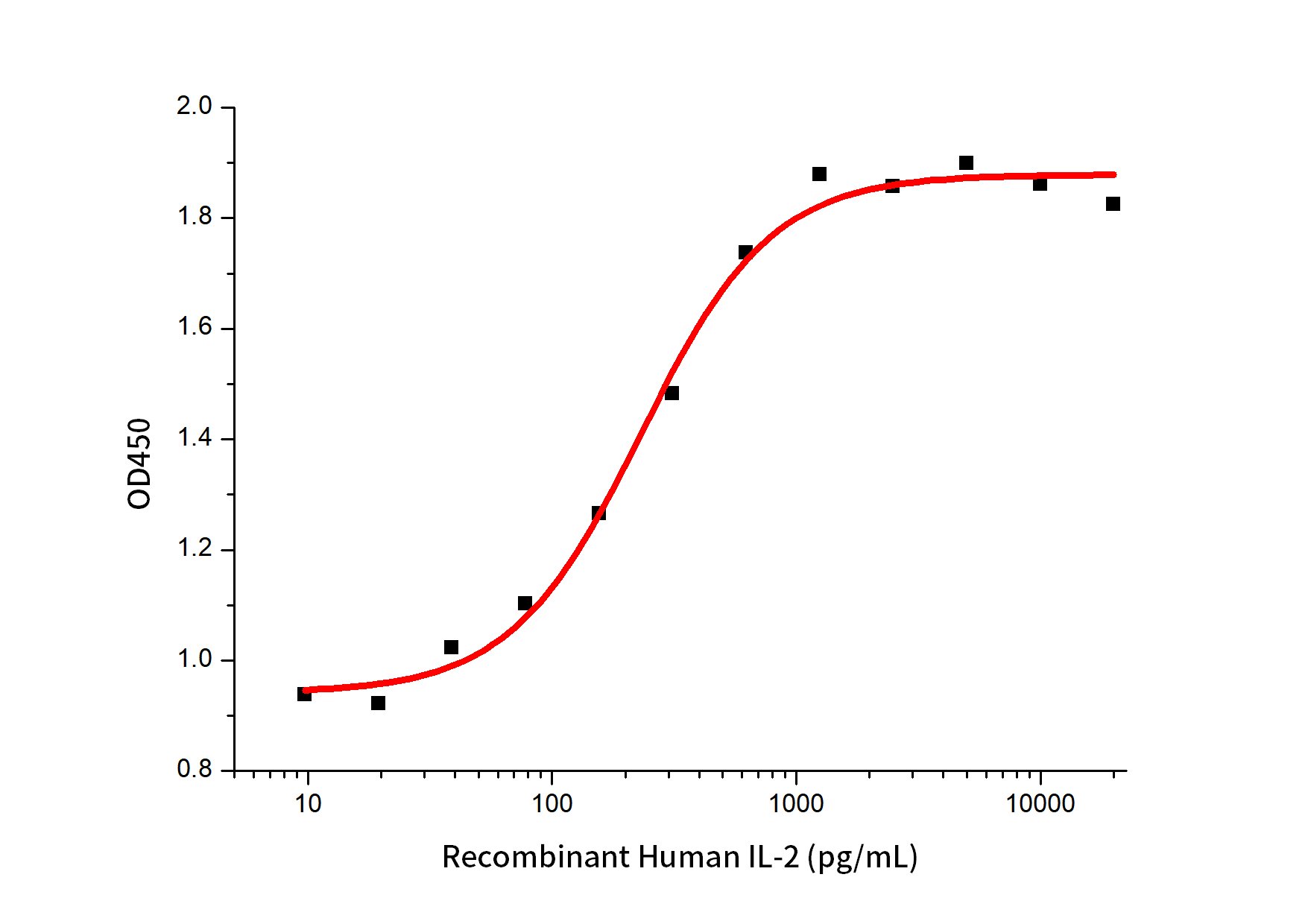#GMP-C013,Recombinant Human IL-2
IL-2又稱為T細胞生長因數,是引起T細胞增殖最重要的細胞因數。IL-2通過與T細胞表面的IL-2受體(IL-2R)的特異性結合而促使T細胞活化,並進入細胞分裂狀態。此外,IL-2還可刺激NK細胞的生長並增強其殺傷能力。IL-2與其家族的其他T細胞生長因數通過共用受體可活化和擴增CD4+與CD8+ T細胞。
IL-2對T細胞和NK細胞的啟動作用通過自分泌和旁分泌方式進行。與T細胞不同,NK細胞不表達α受體亞單位,因此對IL-2親和力較低。但IL-2能促進NK細胞增殖,增強細胞活性和其他細胞因數的分泌。B細胞也受IL-2啟動、增殖和分化。
重組人IL-2蛋白由大腸桿菌表達,採用無動物源性材料生產和藥用輔料製劑。執行《藥品生產品質管制規範(2010年修訂)》,嚴格控制細菌內毒素殘留、宿主蛋白質殘留、外源性DNA殘留等,保證產品品質安全
產品用途
可用於多種體外細胞培養。
保存條件
-20℃,有效期見瓶身
使用建議
- 使用前檢查儲存條件和產品效期符合規定。
- 注射用水複溶,蛋白濃度 > 100 μg/ml。
- 產品複溶和分裝,嚴格控制無菌、無熱原。
- 產品複溶分裝後可置-70℃凍存,應避免反復凍融引起蛋白質變性和其它可能的污染風險。
生物活性-Cell Based Assay

CTLL-2 mouse cytotoxic T cells. The specific activity of Recombinant human IL-2 is ≥ 1.0 × 107 IU/mg, which is calibrated against human IL-2 WHO International Standard (NIBSC code: 86/500)
產品僅供科研或生產使用,不可直接應用於人體。
Quality Control
| Item | Standard |
| Appearance | Solidoid, white porosity |
| Reconstitution | Totally dissolve in stated time |
| Visible particle | Conform to ChP |
| pH value | 3.5-4.5 |
| Purity | ≥ 95% |
| Bioactivity | ≥ 1.0×107 IU/mg |
| Endotoxin | < 10 EU/mg |
| Host protein | ≤ 0.005% |
| Exogenous DNA residue | ≤ 10 ng/mg |
| Mycoplasma test | Negative |
| Sterility test | Conform to ChP |
相關產品:
| Cat# | Product |
| GMP-C070 | Recombinant Human IL-1 alpha |
| GMP-CG93 | Recombinant Human IL-1 beta |
| GMP-C013 | Recombinant Human IL-2 |
| GMP-CD03 | Recombinant Human IL-4 |
| GMP-C009 | Recombinant Human IL-6 |
| GMP-CD47 | Recombinant Human IL-7 |
| GMP-CI58 | Recombinant Human IL-12 |
| GMP-CD72 | Recombinant Human IL-18 |
| GMP-CC45 | Recombinant Human IL-21 |
| GMP-CC79 | Recombinant Human GM-CSF |
產品文獻:
| Title | Author | Year | Journal Title |
| T cells expressing CD5/CD7 bispecific chimeric antigen receptors with fully human heavy-chain-only domains mitigate tumor antigen escape | Dai, Zhenyu, Mu, Wei, Zhao, Ya, Cheng, Jiali, Lin, Haolong, Ouyang, Kedong, Jia, Xiangyin, Liu, Jianwei, Wei, Qiaoe, Wang, Meng, Liu, Chaohong, Tan, Taochao, Zhou, Jianfeng |
2022 |
Signal Transduction and Targeted Therapy |
| DNAM1 and 2B4 Costimulatory Domains Enhance the Cytotoxicity of Anti-GPC3 Chimeric Antigen Receptor-Modified Natural Killer Cells Against Hepatocellular Cancer Cells in vitro | Yao Huang, Jianxing Zeng, Teng Liu, Qingyi Xu, Xianglin Song, Jinhua Zeng | 2020 |
Cancer Management and Research |
| AAVS1 site-specific integration of the CAR gene into human primary T cells using a linear closed-ended AAV-based DNA vector | Wei Chen, Liang Tan, Qungang Zhou, WenSheng Li, Taiming Li, Chun Zhang, Jianxiang Wu | 2020 | JOURNAL OF GENE MEDICINE |
| Therapeutic effect of dual CAR-T targeting PDL1 and MUC16 antigens on ovarian cancer cells in mice | Li Tong, Wang Jiandong | 2020 | BMC CANCER |
| Cancer cell-derived exosomal circUHRF1 induces natural killer cell exhaustion and may cause resistance to anti-PD1 therapy in hepatocellular carcinoma | Zhang Peng-Fei, Gao Chao, Huang Xiao-Yong, Lu Jia-Cheng, Guo Xiao-Jun, Shi Guo-Ming, Cai Jia-Bin, Ke Ai-Wu | 2020 | Molecular Cancer |
| EphA2 chimeric antigen receptor-modified T cells for the immunotherapy of esophageal squamous cell carcinoma | Hui Shi, Feng Yu, Yinting Mao, Qianqian Ju, Yingcheng Wu, Wen Bai, Peiwen Wang, Ran Xu, Maorong Jiang, Jiahai Shi | 2018 | Journal of Thoracic Disease |
| Apoptosis of CD19+ chimeric antigen receptor T cells after treatment with chemotherapeutic agents | Wenfang Yi, Fuyu Pei, Wen Ding, Mo Yang, Guang Lin, Cheng Zhang, Xuedong Wu, Yuelin He, Xiaoqin Feng, Huanying Liu, Zhiyong Peng, Chunfu Li | 2018 | Molecular Medicine Reports |
| Influence of the number and interval of treatment cycles on cytokine-induced killer cells and their adjuvant therapeutic effects in advanced non-small-cell lung cancer (NSCLC) | Yuanlong Gu, Huimin Lv, Juan Zhao, Qi Li, Guannan Mu, Jiade Li, Jiazi Wuyang, Ge Lou, Ruitao Wang, Yanqiao Zhang, Xiaoyi Huang | 2017 | INTERNATIONAL IMMUNOPHARMACOLOGY |
| Phase 1 clinical trial demonstrated that MUC1 positive metastatic seminal vesicle cancer can be effectively eradicated by modified Anti-MUC1 chimeric antigen receptor transduced T cells | You Fengtao, Jiang Licui, Zhang Bozhen, Lu Qiang, Zhou Qiao, Liao Xiaoyang, Wu Hong, Du Kaiqi, Zhu Youcai, Meng Huimin, Gong Zhishu, Zong Yunhui, Huang Lei, Lu Man, Tang Jirong, Li Yafen, Zhai Xiaochen, Wang Xiangling, Ye Sisi, Chen Dan, Yuan Lei, Qi Lin, Yang Lin | 2016 | Science China-Life Sciences |

